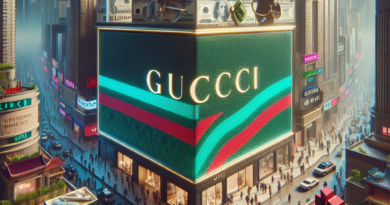Is This the End for High-End Businesses? From Sector Crisis to Future Outlook
Challenges Facing the Luxury Sector
In recent years, the luxury and high fashion sector has encountered significant challenges, influenced by various global factors that have adversely affected the performance of leading companies in this field.
The current climate reveals particularly concerning trends.
The situation in China, geopolitical unrest, and the global economic context have contributed to a downturn in the market, particularly impacting fashion giants like Kering and LVMH, who dominate the global luxury landscape.
Moreover, the surge in technology, especially the growing attention toward artificial intelligence (AI), has shifted investor interest away from industrial and consumer sectors towards tech, amplifying the difficulties faced by these luxury brands.
The Chinese Economic Crisis and Its Impact on Luxury
One of the primary factors adversely affecting the luxury sector in recent years has been China’s economic landscape.
Historically, China has been a crucial market for luxury brands.
However, a notable slowdown in economic growth has surfaced due to the Chinese government’s restrictive policies aimed at reducing dependence on internal consumption and promoting sustainable growth.
Consequently, these measures have significantly impacted consumer spending, particularly on luxury and non-essential goods.
Geopolitical Turbulence and Transportation Issues
Geopolitical tensions and conflicts worldwide have exacerbated the situation for luxury brands.
The ongoing war between Russia and Ukraine, for instance, has led to a decline in purchases by Russian consumers, who have been traditionally strong buyers of luxury goods in Europe.
Furthermore, although the Middle East has always been a strategic luxury market, regional tensions and rising logistical costs have caused a slowdown.
Complications in maritime transport and global supply chain crises have also affected the luxury industry.
The challenge of sourcing premium materials, combined with rising transport costs, has compressed profit margins and hampered companies’ ability to respond promptly to demand.
The Global Economic Context and the Rise of AI
Amid this global economic uncertainty, characterized by rising inflation and pressure on interest rates, consumers have adopted a more cautious purchasing approach.
This shift has significantly reduced demand for luxury goods and discretionary products.
In times of economic hardship, non-essential items often face the first cuts in consumer spending, heavily impacting high fashion companies’ results.
Simultaneously, the tech sector has attracted considerable investment due to disruptive innovations, particularly with the rapid advancement of AI.
Investors, always on the lookout for high returns, have redirected their focus away from luxury goods, resulting in a sell-off of shares from major fashion companies.
Kering and LVMH have notably suffered stock performance declines as a result.
The Luxury Giants: Kering and LVMH
Kering and LVMH are two of the largest global luxury holdings, encompassing some of the most prestigious brands worldwide.
Kering boasts iconic names such as Gucci, Saint Laurent, Bottega Veneta, and Balenciaga, alongside high-end jewelry labels like Pomellato and Boucheron.
Currently, Kering’s shares have plummeted over 50%, reflecting a stark decline in investor interest.
LVMH, an even more expansive player, spans across fashion, leather goods, wines and spirits, watches, perfumes, and cosmetics.
Well-known brands in its portfolio include Louis Vuitton, Christian Dior, and Moët & Chandon.
Yet, LVMH shares have also struggled, going from an initial 20% positive performance to a year-over-year drop of nearly -20% in 2024.
What Is Holding These Companies Back?
This downturn does not appear to affect all luxury sector players.
For example, Ferrari continues to break records and deliver promising results.
Thus, it seems the current stock market downturn is primarily centered on high fashion.
While this pressure has some impact on various consumer discretionary ETFs, it pales in comparison to the significant price contractions of Kering and LVMH, highlighting that consumer reluctance, while prevalent, is not the sole element in the luxury sector’s ongoing crisis—rather, geopolitical factors are stunting recovery in a historically resilient market.



